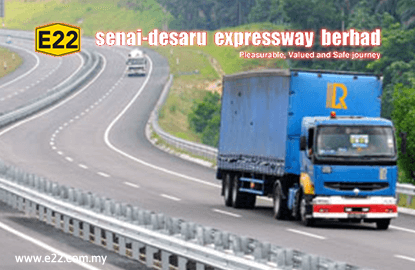
This article first appeared in The Edge Malaysia Weekly, on April 4 - 10, 2016.
SENAI-DESARU Expressway Bhd (SDEB), the concession holder of the 77km highway connecting Senai and Pasir Gudang to Desaru in Johor, made a net profit of RM190.9 million in the financial year ended June 30, 2015 (FY2015), says a company spokesman.
This was despite traffic on the highway falling short of projections. SDEB recorded a gain of RM314.52 million from the restructuring of its irredeemable convertible unsecured loan stocks (ICULS).
The actual traffic in FY2015 was 26,566 vehicles per day (vpd), slightly below the targeted 26,875 vpd, SDEB says in a statement in response to an article in The Edge on March 21, titled “Senai-Desaru Expressway under financial strain, spurs talk of sale”.
Despite the lower-than-expected traffic, SDEB recorded slightly higher revenue of RM47.8 million for FY2015, than the projected RM47.6 million. Earnings before interest, taxes, depreciation and amortisation stood at RM29.5 million, 37% higher than in FY2014.
The statement says actual traffic for the first half of FY2016 was 30,941 compared with the targeted 27,982 vpd while actual revenue was RM28.2 million against the forecast RM26.3 million.
SDEB’s latest financial report for FY2015 cannot be obtained from the Companies Commission of Malaysia (SSM) website. According to its financial report for FY2014, it had RM762.33 million worth of ICULS..
The interest expense of RM66.72 million on the ICULS made up 34.5% of SDEB’s finance cost in FY2014. It is believed that the ICULS’ maturity date has been extended to July 17, 2053, to reflect the extension of the concession period.
According to the company’s FY2014 financial report, the government granted the concessionaire an extension of 15 years, until 2053, on Nov 8, 2013. However, the concession period may expire earlier if the equity internal rate of return reaches 5% in 2048 or earlier.
Besides extending the concession period and the ICULS’ maturity date, the government also required SDEB to lower the coupon rate of the loan stocks to 5% per annum from 12%. The restructuring of the ICULS could have been signed in FY2015, and was thus reflected in the financials.
SDEB recorded losses for three consecutive years to June 30, 2014. As at that date, shareholders’ deficit was RM1.025 billion, after the company accumulated RM1.05 billion of losses over the years. In FY2014, SDEB incurred a RM262.6 million net loss.
That prompted SDEB’s independent auditor Ernst & Young to state in its report that these conditions indicate the existence of a material uncertainty that may cast significant doubt on the company’s ability to continue as a going concern.
That in turn, sparked talk that SDEB’s major shareholder Tan Sri Hamdan Mohamad was looking to sell his shares in the highway concessionaire for RM2.5 billion to RM3 billion. However, Hamdan has denied any plan to sell his stake.
SDEB is a joint venture between Hamdan’s Rancak Bistari Sdn Bhd and YPJ Holdings Sdn Bhd on a 70:30 basis. YPJ is a subsidiary of Johor-owned Yayasan Pelajaran Johor. Hamdan is the largest shareholder of the recently listed Ranhill Holdings Bhd.
With SDEB making a huge profit in FY2015 due to the restructuring of the ICULS, its accumulated losses should now be reduced to RM858.95 million, giving it some breathing space.
Save by subscribing to us for your print and/or digital copy.
P/S: The Edge is also available on Apple's AppStore and Androids' Google Play.